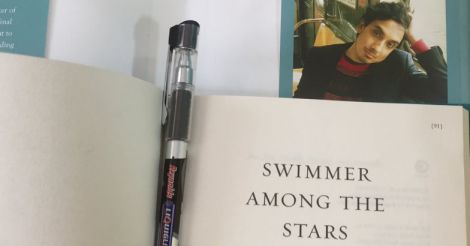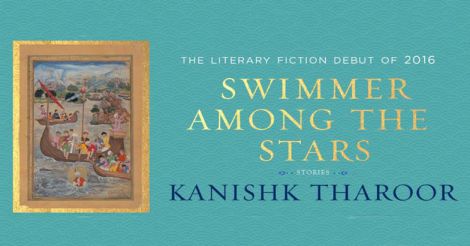Stories are always welcomed, and when they come in clusters and with much variety, you enjoy them to the hilt.
The latest bunch of short fiction by young author Kanishk Tharoor, Swimmer Among the Stars, is a genuine attempt to bring in novelty to the table.
Unlike the recent forays into the Indian literary field (the ones introduced by Chetan Bhagat), Kanishk doesn't opt for a breezy story-telling style. Son of former diplomat Shashi Tharoor, Kanishk is not worried about the confused youth alone but draws our attention to other relevant and varied subjects.
The collection perhaps rightly begins with the journey of an elephant and it’s mahout all the way from Kanishk’s own paternal land of Kerala to the north African country of Morocco. You fully sympathise with the state of a poor mahout who embarks on a journey, sailing across the seas to this foreign land, with his tusker that only understands Malayalam.
The impact of a seemingly irrelevant 'The Fall of an Eyelash' reverberates across continents (reference to The Butterfly Effect, perhaps?).
The imagination in writing is clearly visible, with the author cleverly steering away from the pitfalls of clichés. Whether it is in the freshness in the subjects chosen or how the story unravels, the author in Kanishk Tharoor has been able to stamp his authority in style.
Even when it comes to choosing the plot settings for each of the tales, the author has jumped eras and time zones with an effortless ease. The stories are not set in a specific time frame and we are not told where exactly the stories are unfolding. But credit should be given to the author for sprinkling enough clues to tell us when and where the tale happened.
We are taken through the never-ending stretches of sand dunes in one narrative, while another tale leaves us with a cold shrug after being abandoned in a marooned ship that has hit an ice-berg.
There is one story about 'A United Nations in Space' too – well, the junior Tharoor probably could not have missed hearing that word at dinner at home.
Some references of contemporary issues also find a mention, such as the growing concern over Islamophobia and the loss of precious lives in meaningless conquests of land.
While the language is not too simple, one does not need to stretch your arm for a dictionary with every turn of the page.

Which story shines the best?
I still find it difficult to choose between the 'Swimmer Among the Stars' and the 'Portrait with Coal Fire'. Both of them have a deep chord of reality, which at the same time is moving and depressing.
A journalist himself, the author was able to chronicle a poignant conversation between a magazine photographer (creator) and his photographic creation. The dialogue between the two begins on an appreciative tone, then takes on an offensive voice and then finally ends with dramatic pitch – all of which easily transcend the space between the writer and his readers.
Though there is no deliberate attempt to add dramatics, the author makes sure to keep the reader with him on all the pages.
What the readers didn’t digest?
Some of the references in the stories failed to connect with the reader. As the stories and its characters moved in from one era to the next drawing historical and mythical references, readers are left a bit short-breathed trying to join the dots. But this again, can be taken as an exercise in reading, urging the reluctant reader to take part in the narrative to reach the destination of blissful reading.
With his debut book, Kanishk has definitely put the best foot forward in the world of writing. And when eminent writer Amitav Gosh has heralded the arrival of a writer with 'extraordinary talent', there is little one can argue about.
But it remains to be seen whether the writer can stretch his story-telling skills and recite an arguably tougher narration of a novel.
The long and short of it - Yes, we would like to read more of Kanishk’s works!
























 Photo: Kanishk Tharoor's FB page
Photo: Kanishk Tharoor's FB page
Disclaimer
The comments posted here/below/in the given space are not on behalf of Manorama. The person posting the comment will be in sole ownership of its responsibility. According to the central government's IT rules, obscene or offensive statement made against a person, religion, community or nation is a punishable offense, and legal action would be taken against people who indulge in such activities.